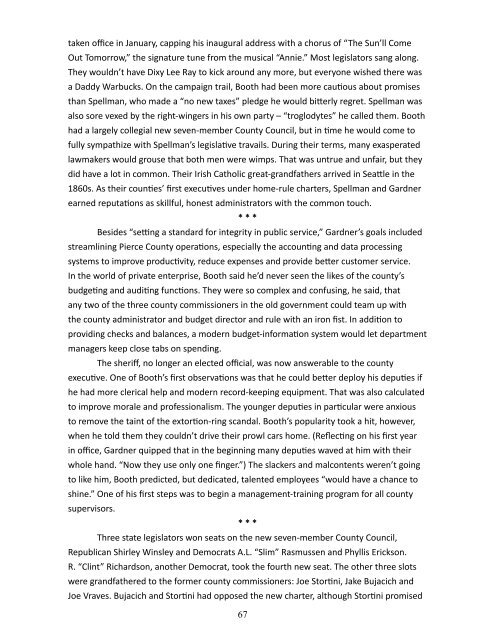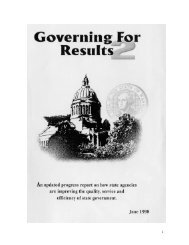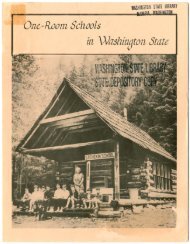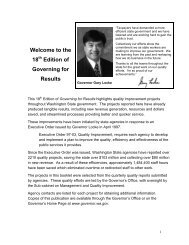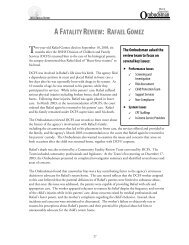BOOTH WHO? - Washington State Digital Archives
BOOTH WHO? - Washington State Digital Archives
BOOTH WHO? - Washington State Digital Archives
You also want an ePaper? Increase the reach of your titles
YUMPU automatically turns print PDFs into web optimized ePapers that Google loves.
taken office in January, capping his inaugural address with a chorus of “The Sun’ll Come<br />
Out Tomorrow,” the signature tune from the musical “Annie.” Most legislators sang along.<br />
They wouldn’t have Dixy Lee Ray to kick around any more, but everyone wished there was<br />
a Daddy Warbucks. On the campaign trail, Booth had been more cautious about promises<br />
than Spellman, who made a “no new taxes” pledge he would bitterly regret. Spellman was<br />
also sore vexed by the right-wingers in his own party – “troglodytes” he called them. Booth<br />
had a largely collegial new seven-member County Council, but in time he would come to<br />
fully sympathize with Spellman’s legislative travails. During their terms, many exasperated<br />
lawmakers would grouse that both men were wimps. That was untrue and unfair, but they<br />
did have a lot in common. Their Irish Catholic great-grandfathers arrived in Seattle in the<br />
1860s. As their counties’ first executives under home-rule charters, Spellman and Gardner<br />
earned reputations as skillful, honest administrators with the common touch.<br />
* * *<br />
Besides “setting a standard for integrity in public service,” Gardner’s goals included<br />
streamlining Pierce County operations, especially the accounting and data processing<br />
systems to improve productivity, reduce expenses and provide better customer service.<br />
In the world of private enterprise, Booth said he’d never seen the likes of the county’s<br />
budgeting and auditing functions. They were so complex and confusing, he said, that<br />
any two of the three county commissioners in the old government could team up with<br />
the county administrator and budget director and rule with an iron fist. In addition to<br />
providing checks and balances, a modern budget-information system would let department<br />
managers keep close tabs on spending.<br />
The sheriff, no longer an elected official, was now answerable to the county<br />
executive. One of Booth’s first observations was that he could better deploy his deputies if<br />
he had more clerical help and modern record-keeping equipment. That was also calculated<br />
to improve morale and professionalism. The younger deputies in particular were anxious<br />
to remove the taint of the extortion-ring scandal. Booth’s popularity took a hit, however,<br />
when he told them they couldn’t drive their prowl cars home. (Reflecting on his first year<br />
in office, Gardner quipped that in the beginning many deputies waved at him with their<br />
whole hand. “Now they use only one finger.”) The slackers and malcontents weren’t going<br />
to like him, Booth predicted, but dedicated, talented employees “would have a chance to<br />
shine.” One of his first steps was to begin a management-training program for all county<br />
supervisors.<br />
* * *<br />
Three state legislators won seats on the new seven-member County Council,<br />
Republican Shirley Winsley and Democrats A.L. “Slim” Rasmussen and Phyllis Erickson.<br />
R. “Clint” Richardson, another Democrat, took the fourth new seat. The other three slots<br />
were grandfathered to the former county commissioners: Joe Stortini, Jake Bujacich and<br />
Joe Vraves. Bujacich and Stortini had opposed the new charter, although Stortini promised<br />
67


